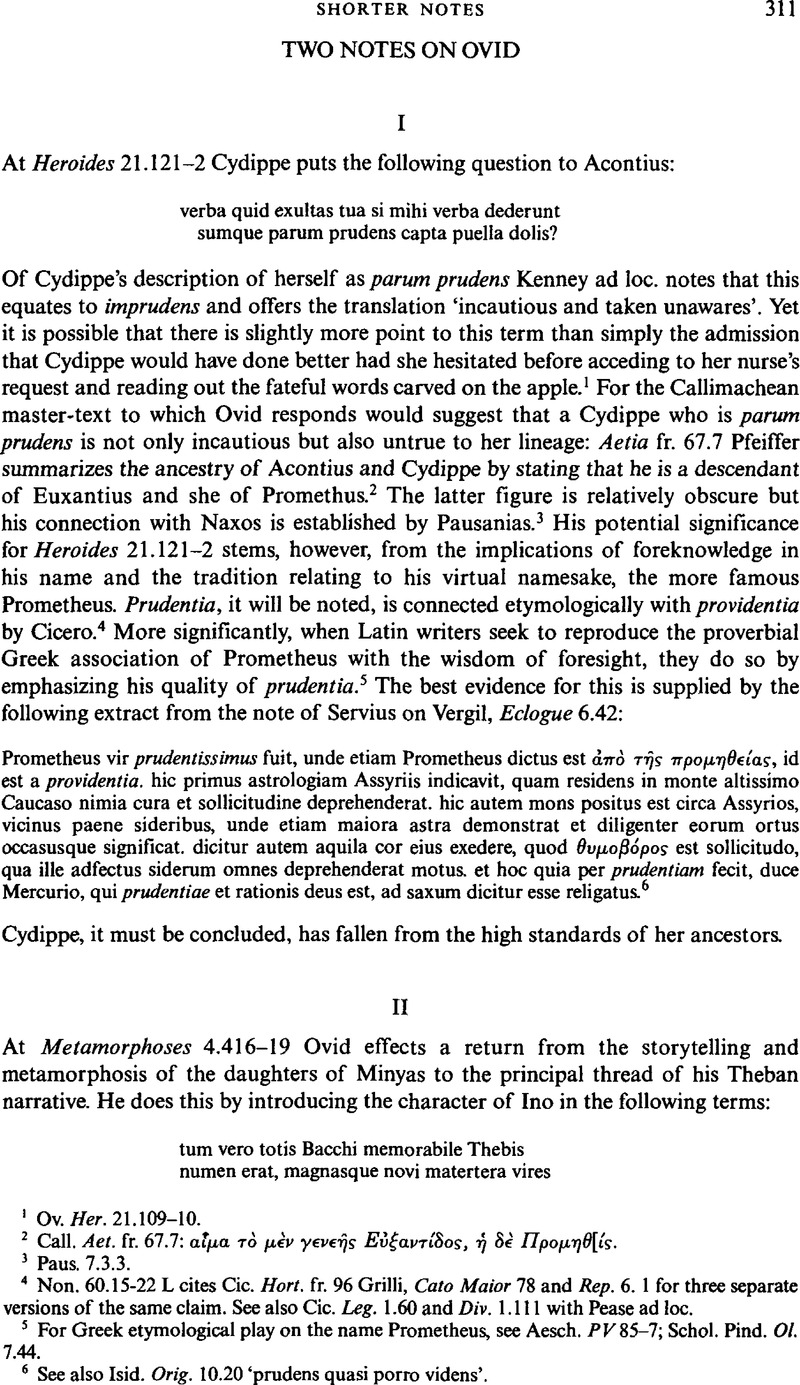No CrossRef data available.
Article contents
Two Notes on Ovid
Published online by Cambridge University Press: 11 February 2009
Abstract

- Type
- Shorter Notes
- Information
- Copyright
- Copyright © The Classical Association 2000
References
1 Ov. Her. 21. 109–10.
2 Call. Aet. fr. 67.7: αἱμα τò μυ γευες Eὐξαυτδoς, δ πρoμηθ[ς
3 Paus. 7.3.3.
4 Non. 60.15–22 L cites Cic. Hort. fr. 96 Grilli, Cato Maior 78 and Rep. 6. 1 for three separate versions of the same claim. See also Cic. Leg. 1.60 and Div. 1.111 with Pease ad loc.
5 For Greek etymological play on the name Prometheus, see Aesch. PV 85–7; Schol. Pind. Ol. 7.44.
6 See also Isid. Orig. 10.20 ‘prudens quasi porro videns’.
7 For discussion, see Longo, V., Aretalogie net mondo greco (Genova, 1969), 11.Google Scholar
8 See Juv. 15.16 with Courtney ad loc. and Suet. Aug. 74.
9 An obvious case is the Erysichthon story in Call. Hym. 6. On this point, see Henrichs, A., ‘Thou shalt not kill a tree: Greek, Manichean and Indian tales’, BASP 16 (1979), 85–108, esp. 85–92.Google Scholar
10 See Bömer at Ov. Met. 4.11.
11 Ov. Met. 3.511–733 tells the story of Pentheus, but all of 3.572–700 is devoted to the story of the Lydian sailors.
12 see Reitzenstein, R., Hellenistische Wundererzählungen (Leipzig, 1906), 151Google Scholar and Fedeli at Prop. 3.17.20.
13 For Terence and the scholion to Juvenal, see Reitzenstein, op. cit. 8–9.
14 For etymological links between ‘vis’, ‘vir’ and ‘virtus’, see Isid. Orig. 11.2.17; cf. Lactant. Opif. Dei 12.
15 See esp. the apostrophe to Liber at Ov. Met. 4.17 and the hymnic Du-stil which marks all of Ov. Met. 4.17–30.
16 Ov. Met. 4.32–5.
17 Ov. Met. 4.36–415, esp. 390 ‘urguet opus spernitque deum festumque profanat’.
18 Ov. Met. 4.391–415.
19 Ino does not profit by her aretalogies. At Ov. Met. 4.419–31, Juno catches sight of her and resentfully catalogues the different achievements of Dionysus—the Lydian sailors, the daughters of Minyas, Pentheus—before resolving to cap them. Ino and her family will be the victims. Ovid engineers an artful transition and now becomes the aretalogist not of Dionysus but of Juno.




